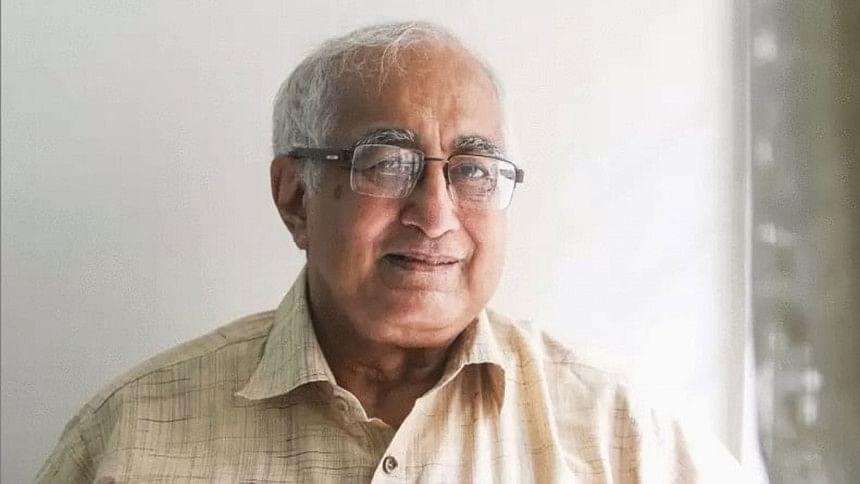Remembering Jamilur Reza Choudhury: A tribute to a visionary

There was every reason for Jamilur Reza Choudhury not to return to the Dacca of 1968 after completing his PhD at the University of Southampton, UK. It was not the best of times being a Bengali in the state called Pakistan, especially when racial identity prevailed over academic brilliance. By then, he had proven his academic genius and had been told about all the opportunities that awaited him if only he wanted the world to be the stage. But he chose the road less travelled by and, as he used to say, it was not a difficult decision.
Prior to his post-graduation studies in UK, he had received education mostly at government institutions almost at no expense and he thought it was time to give something back. He kept on doing that till the last day of his life. When JRC, as he was reverently and fondly known to everyone, passed away on April 28, 2020, it was the departure of the most luminous star in the firmament of science and engineering in Bangladesh.
But JRC was much more than an engineering genius to the nation. He epitomised what the people of this country earnestly looked for among its leaders and intellectuals—he was a man of highest personal integrity. It is therefore hardly surprising that he was a most sought after person to lead and be part of activities that hardly had any relation to his professional expertise. This was only because of his impeccable credentials of honesty and unquestioned moral rectitude.
As the chairperson of Bangladesh Poribesh Andolon (BAPA) from 2001 to 2006, he led the environmental activism to protect the rivers and water bodies of the country with vigour and unflinching courage. Till his death, he was serving as the chairperson of the Bangladesh chapter of People's Saarc Water Forum. Among the numerous organisations that he associated himself with dedication and care was the renowned Diabetic Association of Bangladesh, of which he was the vice president.
Within his own field of structural engineering, JRC had probably contributed to almost every one of Bangladesh's recent mega infrastructural projects. From the Bangabandhu Bridge over Jamuna to the ongoing engineering tour de force Padma Bridge, he had led the technical panel of experts with vision and innovation. Development projects like Karnaphuli underwater tunnel in Chattogram and the Dhaka elevated expressway, that have far reaching impacts on the future shape of these cities, had been progressing steadily under his stewardship. At the age of 77 and up to the time of his unexpected demise, JRC was as active as he had been in his youth.
From the day when a young JRC was first exposed to the use of computers during post-graduate studies in UK, the idea of information technology's capability of transforming a society remained with him. To transform the ideas into action, he pioneered the establishment of Bangladesh's first computer centre in Buet and remained associated with it for a decade. Just as he had earlier identified the priorities of the newly liberated Bangladesh, JRC realised that with the advent of the new millennium, he should focus on the nation's future that depended on digitisation and information technology. He played instrumental roles in IT policy making bodies in government, including serving as the convener of Committee for Formulation of IT Policy for Bangladesh and as a member of the Prime Minister's Task Force on developing Digital Bangladesh.
JRC envisioned a knowledge based society in Bangladesh. He had always been a believer in the talents of Bangladeshi youth and together with equally zealous and likeminded band of enthusiasts, he had been leading the Bangladesh Mathematical Olympiad in identifying geniuses from schools and colleges from locations all around the country. In one of the gatherings of BMO, he once declared his belief of a Bangladeshi winning a Nobel in the field of science within 2030.
It is interesting to note that JRC, through his own life and activities, deconstructed the stereotypical social perception of a genius. In their book The Genius Famine (2016), authors Charlton and Dutton concluded that geniuses seldom fit into normal society and they seldom want to. JRC was an exception. With confidence and self assurance, he had been actively interacting and contributing to so many segments of the society and it made him among the most socially connected intellectuals of contemporary Bangladesh. This attribute was perhaps acquired during the early part of his life, where due to his father's job postings, he was exposed to people of diverse culture and backgrounds. For him, the discourse of knowledge was as much about the people as they were about ideas.
If anything equalled JRC's erudition, it was his humility and compassion. He could be approached by the youngest of his students and he dedicated his precious time addressing their queries. His relatives were amazed by his habit of enquiring about everyone's well being throughout the year. Even being the busy person that he was, he would visit or call the children of his deceased school friends every once in a while and reassure them. He was the first person to share the success stories of his students in social media, just as he was in condoling the passing away of an old colleague or alumni. In October 2019, when Abrar Fahad was brutally murdered in Buet campus, JRC went back to his alma mater to lead the calls for restoring dignity of life in the campus.
April, as Eliot wrote in "The Wasteland", is the cruellest month. In a country where shortage of persons of integrity has never been as acute as now, Jamilur Reza Choudhury's sudden departure created a gaping void that will be hardest fill.
Mamnoon Murshed Chowdhury is an architect who graduated from Buet and a visiting faculty at the University of Asia Pacific.

 For all latest news, follow The Daily Star's Google News channel.
For all latest news, follow The Daily Star's Google News channel. 



Comments